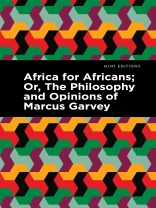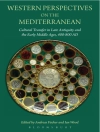Originally published in two volumes between 1923 and 1925, Africa for Africans: Or, The Philosophy and Opinions of Marcus Garvey is a compilation of letters, speeches and essays by one of the Fathers of Pan-Africanism.
Hailed by Martin Luther King, Jr. as, ‘the first man of color. . . to make the Negro feel like he was somebody, ‘ Marcus Garvey was a polarizing yet influential figure whose legacy continues to be felt today. These philosophies, collected by Amy Jacques Garvey, his second wife and a pioneering journalist, chronicle Garvey’s initial impressions and recollections of America, the formation of the Universal Negro Improvement Association (UNIA), his imprisonment and subsequent trial over the Black Star Line, and his scathing opinions of the National Association for the Advancement of Colored People (NAACP).
Including such pieces as, ‘An Appeal to the Soul of White America, ‘ ‘The Negro’s Greatest Enemy, ‘ and ‘Declaration of Rights of the Negroes of the World, ‘ Africa for Africans; Or, The Philosophy and Opinions of Marcus Garvey is an essential piece of Black history, professionally typeset and reimagined for modern readers.
Since our inception in 2020, Mint Editions has kept sustainability and innovation at the forefront of our mission. Each and every Mint Edition title gets a fresh, professionally typeset manuscript and a dazzling new cover, all while maintaining the integrity of the original book.
With thousands of titles in our collection, we aim to spotlight diverse public domain works to help them find modern audiences. Mint Editions celebrates a breadth of literary works, curated from both canonical and overlooked classics from writers around the globe.
Circa l’autore
Amy Jacques Garvey (1895 – 1973) was a pioneering journalist in the 20th century. Born in Kingston, Jamaica, Garvey enjoyed a life of privilege wherein she was able to receive a formal education and engage in extracurricular activities. An accomplished scholar, Garvey continued her pursuit of worldly knowledge and financial independence until 1917 when she emigrated to the United States and met Marcus Garvey. Taken in by Garveyism and the societal expectations of being a wife, Garvey often took a backseat in her husband’s political pursuits; however despite this, she gained a reputation as a great orator and took on a lead role at the United Negro Improvement Association following her husband’s imprisonment in 1922. During this time she published four books on her husband and his work including The Philosophy and Opinions of Marcus Garvey (Volumes I and II, ) The Tragedy of White Injustice and Selections From the Poetic Meditations of Marcus Garvey. After his deportation in 1927, the pair moved back to Jamaica with their children and in the wake of his death in 1940 she continued her efforts to support Black Nationalism with two books of her own, Garvey and Garveyism and Black Power in America: The Power of the Human Spirit.












